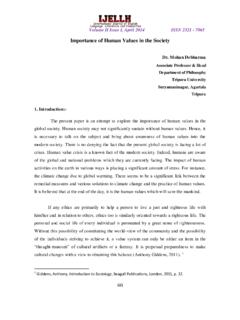Transcription of Relationship-based practice: emergent themes in social ...
1 INSIGHTS. A SERIES OF EVIDENCE SUMMARIES. 41. Relationship-based practice: emergent themes in social work literature RICHARD INGRAM & MARK SMITH (UNIVERSITY OF DUNDEE). FEBRUARY 2018. INSIGHT 41 Rel ationship- based practice: emergent themes in social work literature 2. Acknowledgements This Insight was reviewed by Helen Allbutt (NHS Education for Scotland), Robyn Kemp (Centre for social Work Practice), Rebecca Laing (Angus Council), Pearse McCusker (Glasgow Caledonian University), Neil MacLeod (Scottish social Services Council), Neil Quinn (University of Strathclyde), Susan Taylor (East Ayrshire Health and social Care Partnership), David Watson (East Ayrshire Council) and colleagues from Scottish Government. Comments represent the views of reviewers and do not necessarily represent those of their organisations.
2 Iriss would like to thank the reviewers for taking the time to reflect and comment on this publication. This work is licensed under the Creative Commons Attribution-Non Commercial-Share Alike UK: Scotland Licence. To view a copy of this licence, visit Copyright February 2018. I N SIG HT 41 R el atio nshi p- bas ed pr ac tic e: em erg ent th em es in soc ial wo r k liter atu r e 3. Key points There are compelling philosophical, policy and practice reasons to put relationships at the heart of social work The importance of relationships is increasingly recognised in people work' but especially in social work and social care, across all domains of practice Effective relationships are central to successful outcomes Current policy directions in Scotland are rooted in the need for effective personal/.
3 Professional relationships Relationships are complex, requiring an awareness of self' and the negotiation of inter-personal boundaries Current practice cultures can make it difficult to practice in properly relational ways and would require a radical shift for issues of power, agency and status to be addressed INSIGHT 41 Rel ationship- based practice: emergent themes in social work literature 4. History doctrine of managerialism, which, in essence, sought to bring business and market principles to public The roots of an emotional dimension to social services. Managerialism was rooted in principles of work can be traced back to the psychoanalytic and economy, efficiency and effectiveness and is evident psychosocial models that emerged in the mid-20th in practice contexts in the turn towards targets and century (Horney, 1950; Rogers, 1961; Hollis, 1964), performance management.
4 social work became a which highlighted the importance of previous technical/rational rather than an ethical and relational experiences and how emotions are managed and endeavour. Within such cultures, relationships can understood through relationships. At another level, appear too woolly' and difficult to measure and Biestek's (1957) seminal exposition of social work's have become secondary to forms of practice that, ethics includes what are clearly relational principles even when practitioners might claim to work in such as purposeful expression of feelings, controlled relational ways, are increasingly framed around emotional involvement and acceptance. following procedure and ensuring compliance. Psychosocial models of practice attracted some Any view that relationships are secondary to a more criticism due to claims that they minimised wider instrumental form of social work practice is, however, societal and political factors, and focused primarily, misconceived.
5 The centrality of relationships to social on the inner worlds of individuals. This, it was argued, work continues to be universally, and increasingly, ran the risk of locating people's difficulties and recognised. Relationships are variously described solutions primarily at an individual level. Nevertheless, as being at the heart of social work' (Trevithick, it remained self-evident, even in such critiques, that 2003), a cornerstone' (Alexander and Grant, 2009);. relationships were central to social work. an absolute precondition' (O'Leary and colleagues, 2013). They are essential rather than incidental'. The 1980s, however, saw the increasing dominance (Alexander and Grant, 2009). Fewster (2004). of neoliberal political and economic ideology.
6 Suggests that within the caring role, the relationship This was manifest in public services through the is the intervention. In recent years the concept of INSIGHT 41 Rel ationship- based practice: emergent themes in social work literature 5. Relationship-based practice (RBP) has become a Such dualism has since been a powerful driver of way of articulating the centrality of the relationship intellectual belief. It has percolated understandings between social workers and service users (Ruch, of professions such as social work, where workers Tierney and Ward, 2010; Hennessey, 2011; Megele, are encouraged to separate their personal from 2015; Bryan and colleagues, 2016). RBP is not a their professional selves. Qualities of detachment method or an approach to social work that can be and objectivity and professional distance'.
7 Picked from a menu of alternatives; rather, it is at the are encouraged, while emotional involvement heart of whatever approach might be adopted across with clients can be seen as unprofessional. different client groups and domains of practice. Other strands of Enlightenment thinking, however, A philosophical basis for especially those of Scottish philosophers, questioned Relationship-based practice this turn to reason. David Hume, for instance, proclaimed that reason is but a slave to the RBP is not technical, instrumental or methodological passions individuals acted not merely on reason but confronts central philosophical questions around or self-interest, but were drawn more instinctively who we are and how we are with others.
8 Philosophers by a notion of moral sentiment. Adam Smith have grappled with such questions over the years. called this innate human quality sympathy', which Since the Enlightenment, that period of scientific posits that people are naturally compassionate and philosophical advance that swept Europe in and moved by the plight of others (Hearn, 2016). the 17th and 18th centuries, which signalled the Sympathy involves an awareness of others'. beginning of the modern period in history, human feelings, although resists emotional entanglement existence and action has been defined by the ability in them. Indeed, one can react sympathetically'. to reason. Reason was elevated above emotion but not necessarily approvingly to another's and the thinking self' above the feeling one.
9 This predicament. Nevertheless, it evokes responses involved a corresponding assumption that human that are relational and instinctive or embodied, beings could separate off the mind from the body. rather than abstract and overly intellectual. INSIGHT 41 Rel ationship- based practice: emergent themes in social work literature 6. Moving forward a couple of centuries, John extended beyond individual relationships to inform Macmurray resurrected this concern about the political debate (Held, 2006). Care ethics entails a relationship between reason and emotion, arguing shift in focus away from rules and rights towards that excessive rationality acts to marginalise the responsibilities and relationships. Relationships are role of emotions in the human condition (Fielding, bi-directional involving an inevitable mutuality a 2012).
10 Macmurray conceives of human beings not as client's personality and preferences influence levels autonomous, rational individuals but as persons in and degrees of closeness, entailing that the nature relation', existing only by virtue of their relationships of any personal/professional relationship varies from with others. Personal relations were also at the heart client to client. There is, therefore, no one way of of Scottish psychotherapeutic thinking over the doing RBP. Care ethics are proposed by Meagher and course of the 20th century (Sharpe, 2016). Parton (2004) as offering an alternative to dominant managerial modes of practice in social work. Tronto (1993) draws on Scottish ideas of moral sentiment in her seminal work on care ethics, which has Relationship-based practice become an important strand in ethical thought across a and policy range of academic and professional disciplines.












